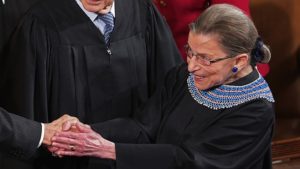How about settling down just a bit, Republican members of Congress?
They’re all up in arms over remarks Supreme Court Justice Ruth Bader Ginsburg made about presumptive GOP presidential nominee Donald J. Trump, about how she cannot imagine a country with Trump as president.
Rep. Randy Weber of Texas said Ginsburg ought to resign. Trump said the same thing. As the Hill reported: “The recent comments of Supreme Court Justice Ginsburg on Republican Presidential nominee Donald Trump are the antithesis of Lady Justice and in direct violation for what the highest court in the land stands,” he said. “Justice Ginsburg’s actions must be met with consequences. I agree with Donald Trump that she should resign.”
While I agree that Ginsburg crossed a line, violated an unwritten rule about justices getting too politically partisan, let’s take heed of what the framers did when they wrote the U.S. Constitution.
They created an independent branch of government called the “judicial branch.” Judges get lifetime appointments to their posts. The idea was to enable them to be free of political pressure brought by the executive or legislative branches of government.
The founders got it right.
Ginsburg didn’t need to pop off as she did about Trump. But she isn’t the first justice to get involved in politics. In the earliest years of the Republic, justices ran for political office while sitting on the Supreme Court.
That kind of overt politicking, of course, hasn’t occurred in many years.
I don’t expect the Supreme Court to hear cases involving Trump while Ginsburg is sitting on that bench. However, I don’t doubt the justice’s ability to judge any case involving Trump fairly.
Although the framers had the right idea when they created an independent judiciary, they could not possibly remove politics from its actions.
I bring you Bush v. Gore in 2000, in which five Republican-appointed justices stopped the ballot-counting in Florida with GOP candidate George W. Bush leading Democratic opponent Al Gore by 537 votes out of more than 5 million cast in that state. Bush won Florida’s electoral votes and became president by the narrowest of margins.
Do you think politics played any role in that decision?
Well, that’s how the system worked.
As for the present-day dustup over Justice Ginsburg’s remarks, she made them, but let’s quell the talk about “consequences.”
Ginsburg was entitled to say what she said.
